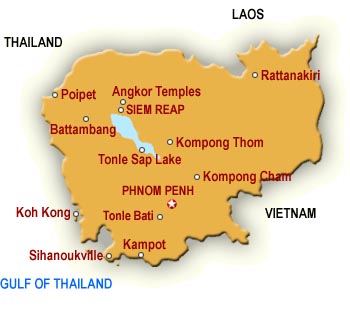Khmer Rouge torture chief says he never wanted to run prison
 Phnom Penh - The Khmer Rouge's former chief torturer told Cambodia's UN-backed genocide tribunal Monday he never wanted to become the warden of a notorious prison where more than 15,000 people were sent to be murdered, saying he had hoped to be a teacher after the ultra-Maoist group came to power in 1975.
Phnom Penh - The Khmer Rouge's former chief torturer told Cambodia's UN-backed genocide tribunal Monday he never wanted to become the warden of a notorious prison where more than 15,000 people were sent to be murdered, saying he had hoped to be a teacher after the ultra-Maoist group came to power in 1975.
Kang Guek Eav, known by his revolutionary name Duch, was a mathematics teacher before joining Pol Pot's Communist Party of Cambodia (CPK) in the early 1960s and said he had "sacrificed everything," including his job and salary, for the revolution.
"The only thing I loved in life was teaching," he said. "I wished that when the revolution was over I would be able to teach again."
In the tribunal's first trial, Duch, 66, faces charges of crimes against humanity, torture, premeditated murder and breeches of the Geneva Conventions, allegedly committed while he headed the notorious Tuol Sleng torture prison in Phnom Penh.
The born-again Christian last week begged the families of victims and the handful of prison survivors to forgive him for crimes he committed at the school-turned-torture facility.
It was the first time any Khmer Rouge leader or apparatchik had made such an apology.
As the trial entered its second week Monday, judges questioned Duch about his time in the pre-revolutionary CPK and his involvement in the establishment of M-13 - a centre the Khmer Rouge ran during its rebellion against the US-backed military regime from 1971 to
1975.
Duch displayed a sharp memory for dates and names, recalling the exact dates on which he joined the CPK, met various Khmer Rouge members and when he was arrested and detained during the rule of former king and independence leader Norodom Sihanouk.
He said he was sentenced to 20 years prison for sedition in 1968 but was released after General Lon Nol led a coup against the Sihanouk in 1970.
"Lon Nol released political prisoners to show the world that Sihanouk was vicious," he said. "If Richard Nixon did let Lon Nol start the coup and Sihanouk had not become aligned with the Khmer Rouge, then the Khmer Rouge would never have succeeded."
Duch is one of five former leaders facing trial for their roles in the deaths of up to 2 million people through execution, starvation or overwork when the group sought to transform modern Cambodian society into an agrarian utopia, erase history and start again at "year zero" during its 1975-1979 reign.
His trial resumed as United Nations legal officials met with the Cambodian government to discuss an investigation into alleged corruption at the hybrid court, which has been riddled with controversy since it was established in 2006.
Peter Taksoe-Jensen, UN Assistant Secretary for Legal Affairs, and Deputy Prime Minister Sok An have pledged after previous discussions to conduct simultaneous investigations into allegations that Cambodian staff at the court were forced to pay kickbacks to their superiors.
The court has also faced allegations of government interference and disagreement between domestic and international prosecutors over plans to extend the investigation and arrest more former leaders.
Prime Minister Hun Sen said last week that arresting more detainees would put the country at risk of civil war. He said he would rather see the court fail than let the country return to conflict.
The court's 500-seat public gallery was about half full Monday, but the national TV network suspended its live broadcast of the court, which had run throughout the previous week's sessions. (dpa)